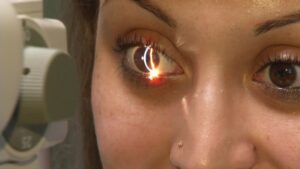The length of time that some changes take place after your eye surgery LASIK will be determined by your age at the time of the procedure and whether or not you have any other progressive eye diseases.
Following eye surgery lasik, one’s vision changes.
However, while eye surgery LASIK permanently alters your eyesight, there are a variety of reasons why your vision may change after LASIK surgery.
Your vision may alter over time if the initial ailment that impaired your vision — such as myopia (nearsightedness), hyperopia (farsightedness), or astigmatism (blurry vision) — continues to worsen. This is according to the American Refractive Surgery Council. It is possible that your eyesight will alter as a result of this journey.

Another typical reason for vision changes to occur years after eye surgery LASIK is a normal eye alteration known as presbyopia, which occurs as the eyes get older. It occurs as you grow older and your lens becomes less flexible, making it less able to concentrate on items in your immediate vicinity.
The length of time that eye surgery LASIK “lasts” will be determined by your age at the time of surgery and the extent to which your eye diseases advance if they progress at all.
The vast majority of patients who get eye surgery LASIK are satisfied with their vision even after ten years of treatment.
According to one research, 35% of people who underwent eye surgery LASIK required to have it redone after ten years of wear and tear. Another research, conducted by Trusted Source, tracked patients who underwent eye surgery LASIK for nearsightedness and/or astigmatism. The researchers discovered that around 10% of study participants suffered age-related visual alterations during the course of the study’s 12-year duration.
If your vision becomes blurry again for whatever reason after your initial treatment, you may be able to have LASIK enhancement performed even years after your initial procedure. It is dependent on how much tissue was removed during the initial treatment and how much tissue is remaining after that procedure.
What exactly is eye surgery lasik?
After hitting the cornea, the clear outer layer of your eye, light bends and becomes focused on the retina, which is located in the rear of your eye. This is referred to as refraction.
Due to the fact that it does not bend appropriately, light does not focus on your retina, causing your eyesight to become blurry. A refractive error is what is referred to as this.
Laser vision correction (LASIK) can be used to correct the three most common forms of refractive errors:
• Nearsightedness is a condition that affects vision (myopia).
When you gaze at objects that are close to you, your vision is keen, but when you look at things that are far away, your eyesight is hazy.
• The ability to see the future (hyperopia).
When you gaze at objects that are far away, your vision is crisp, but when you look at things that are close, your eyesight is hazy.
• Astigmatism.
Blurred vision is produced by an abnormality in the shape of the cornea, which is the front of the eye.
Eye surgery LASIK is a procedure that corrects these issues by reshaping your cornea with lasers or tiny blades. It takes time, but once it is completed, light bends appropriately and is focused on your retina.
As a consequence, you will have clear, crisp vision both up close and far away. The ultimate objective is to correct your eyesight to the point where you no longer require glasses or contacts. You can read about How to manage the use of contact lenses after LASIK by visiting http://ancestorbridge.com/how-to-manage-the-use-of-contact-lenses-after-lasik/
What to Expect Immediately Following eye surgery lasik
Following the surgery, you may have one or more of the following symptoms, which should subside within a few weeks to months:
- Vision that is foggy or hazy
- Eyes that are dry and itching
- Increased sensitivity to light; visual abnormalities such as double vision, glare, and haloes; and other symptoms

When you get eye surgery LASIK, it is critical that you do not rub or poke your eye since this might cause the flap to shift out of position and interfere with the healing process.
After having eye surgery LASIK, you may find that you no longer need to use your glasses or contact lenses. Although they may not be necessary for many jobs, such as reading or driving, if your eyesight is not completely restored, they may be necessary for some.
eye surgery LASIK is a procedure that permanently and irrevocably changes the shape of your cornea. Although this is true, it does not imply that your eyesight will remain clear for the rest of your life. eye surgery LASIK cannot reverse the changes in the eyes that occur as a natural part of the aging process.
Around the age of 40, practically everyone requires reading glasses owing to impaired close-up vision caused by presbyopia (age-related macular degeneration). eye surgery LASIK will not be able to correct this issue.
Choosing a lasik surgeon: some suggestions
When selecting a doctor to do your eye surgery LASIK procedure, keeping the following items in mind may be beneficial:
Consult with your primary care physician, as well as family and friends who have had LASIK to assist you in selecting a doctor.
- Choose a LASIK surgeon who has conducted a large number of LASIK treatments and has a high success rate.
- Choose a doctor whose office is at a convenient location for you.
- Choose a doctor that does eye surgery lasik in the manner that you desire (all laser, bladed, or custom).
- Compare prices and choose a doctor that is both inexpensive and offers payment alternatives that are convenient for you.
- Make sure that any clinics that promote substantially reduced or “cheap” eye surgery lasik are legitimate before deciding to have the treatment there.
- Determine exactly what is included in the price and make certain that there are no additional, unexpected fees, such as those associated with follow-up appointments.
- Most crucial, find a doctor with whom you are comfortable and in whom you have confidence.
Final thoughts
An eye surgery treatment called laser-assisted in situ keratomileuses (LASIK) can significantly enhance your eyesight. It permanently alters the form of the tissue at the front of your eye, and these modifications persist for the rest of your life. However, as part of the normal aging process, the majority of people’s eyesight deteriorates with time. Because eye surgery LASIK cannot prevent this from happening, your vision may become blurry again as you grow older.



